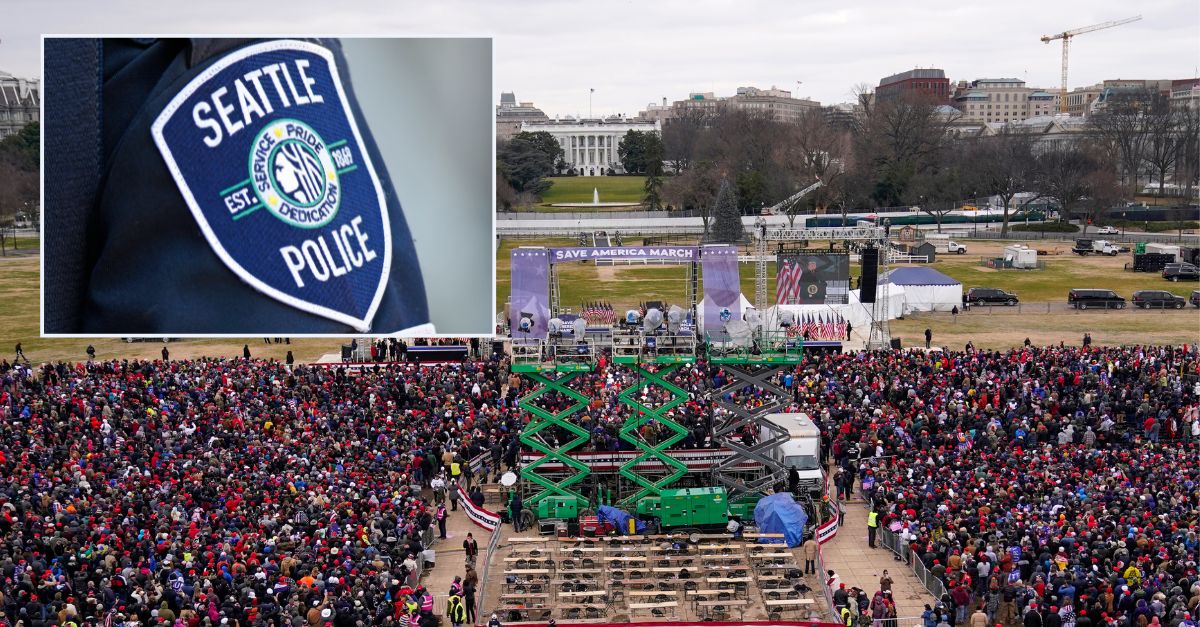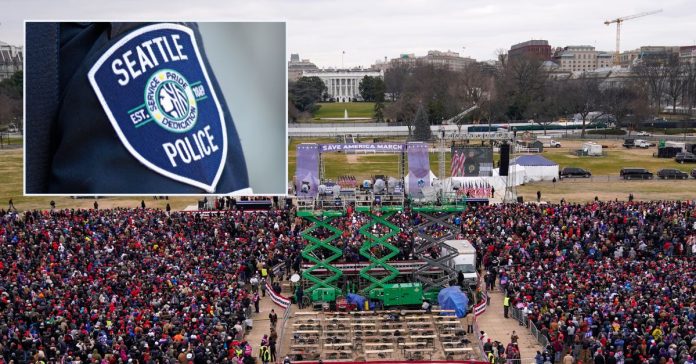
Background: President Donald Trump speaks during a rally Jan. 6, 2021, in Washington, on the Ellipse near the White House. (AP Photo/Evan Vucci, File)/Inset: A Seattle Police Department patch is seen on an officer’s uniform, July 17, 2016, in Seattle. (AP Photo/Ted S. Warren, File).
A group of police officers who attended the “Stop the Steal” rally on Jan. 6, 2021 — where Donald Trump spoke ahead of the U.S. Capitol attack and told attendees, “If you don’t fight like hell, you’re not going to have a country anymore” — has been denied an appeal by Justice Elena Kagan after calling on the U.S. Supreme Court to keep their names and rally conduct under wraps, saying it violates their First Amendment “right to privacy” and “constitutes harassment” if police release the info in public incident reports.
Kagan, a Barack Obama appointee, rejected the group’s emergency application for a stay Tuesday after it was filed in late June with the nation’s highest court following an earlier and unanimous denial by the justices on June 4. The cops claimed in their latest application on June 25 that the last one did not address the “immediate harm” they said is now present due to the status quo being such that the officers’ identities were still anonymous because they were “litigating in pseudonym,” per the filing.
“As soon as this denial of stay was issued … the respondents attempted to alter the status quo at the trial court by filing a motion to force the petitioners to cease litigating in pseudonym,” the group’s application said. “On June 18, 2025, the King County Superior Court granted this requested relief, and issued an order barring the use of pseudonyms and unsealing the docket in this case.”
Love true crime? Sign up for our newsletter, The Law&Crime Docket, to get the latest real-life crime stories delivered right to your inbox.
On June 23, the U.S. Court of Appeals confirmed the lower court’s order and denied the group’s emergency motion for a stay.
“Thus, now that an imminent harm has arisen, and it is without a doubt that there is no State Court mechanism to prevent the imminent harm,” the group said. “By requiring the [cops] to use their names in the case caption and unsealing the docket, the exact injury they are litigating against would be incurred as a result, undermining their ability to assert their First Amendment Privacy Rights in political beliefs and associations.”
In February, the Washington state Supreme Court came to the conclusion that the individuals suing the Seattle Police Department should not be afforded anonymity. Their identities, the justices said, should be released following the completion of the SPD’s investigation into whether any cops attended both the Jan. 6 attack that day and acted violently.
The plaintiffs, who are identified by their lawyers using “John Doe” pseudonyms, insist it’s a violation of their First Amendment right to privacy to have the department release the results of its probe. Investigators at the Office of Police Accountability (OPA) determined in a final report that three of the officers did not violate department policy, while the fourth’s conduct was deemed inconclusive.
After being notified of a number of public records requests targeting their attendance at the Jan. 6 rally, the group brought its suit against the City of Seattle and SPD, seeking declaratory and injunctive relief to prohibit the “public disclosure of unredacted investigatory records,” per their Supreme Court petitions.
“Although the public is entitled to be informed concerning the workings of its government, and the SPD is entitled to investigate potential wrongdoing on the part of its officers, this entitlement cannot be unlimited and inflated into general power to invade the constitutional privacy rights of individuals,” the June 25 application says. “Core components of personal identity, such as political activities, are deeply private and not the proper subject of a public records request. Police officers are entitled to the same constitutional protections as all other Americans, and do not forfeit those rights by merely attending a political rally.”

